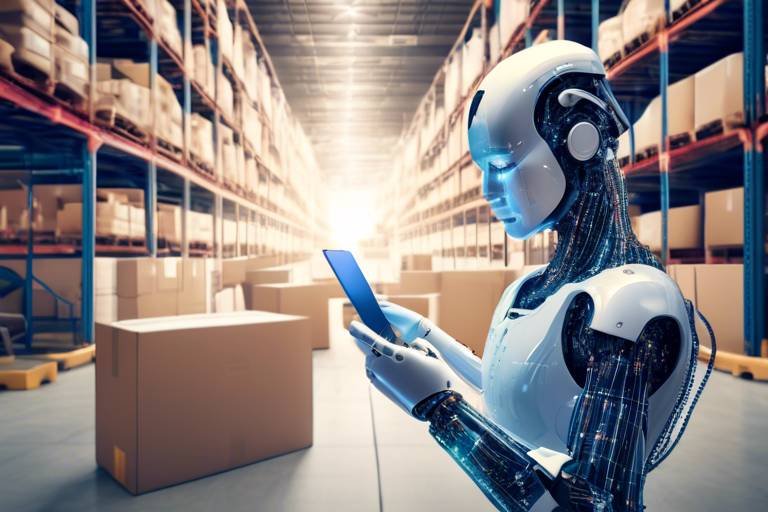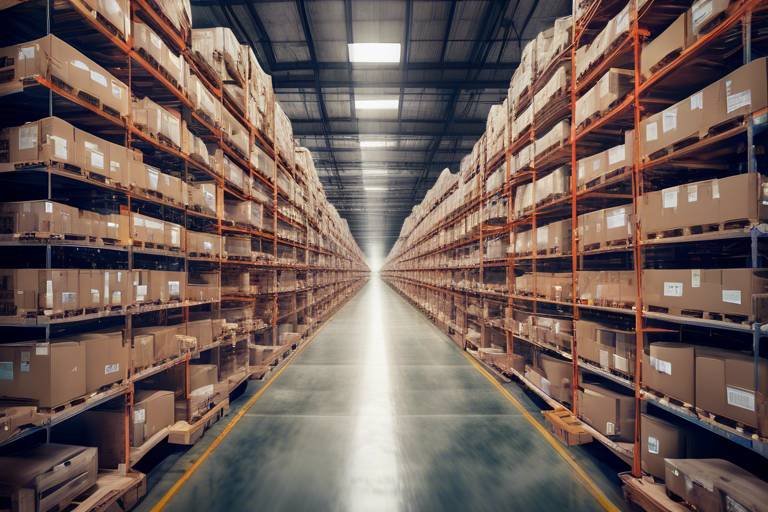How AI Will Revolutionize Supply Chain Management
In today's fast-paced world, the intersection of technology and business is more pronounced than ever, and artificial intelligence (AI) is leading the charge. Imagine a world where supply chains operate seamlessly, anticipating market demands before they even arise. This is not a distant dream; it is the reality that AI is crafting for supply chain management. By integrating AI into supply chains, organizations can achieve unprecedented levels of efficiency, reduce costs significantly, and enhance decision-making processes across various industries. Whether you're a small business or a large corporation, the transformative power of AI can offer you a competitive edge that is hard to ignore.
To appreciate the impact of AI on supply chains, it’s essential to understand what AI truly is. At its core, artificial intelligence refers to the simulation of human intelligence in machines programmed to think and learn. In the realm of supply chain management, AI technologies, such as machine learning, predictive analytics, and natural language processing, can be harnessed to streamline operations. For instance, AI can analyze vast amounts of data to identify patterns and trends, enabling businesses to make informed decisions swiftly. This capability is akin to having a crystal ball that provides insights into future market behaviors, allowing companies to proactively adjust their strategies.
The integration of AI into supply chain management comes with a plethora of benefits that can dramatically transform operations. One of the most compelling advantages is cost reduction. By leveraging AI, organizations can automate routine tasks, optimize inventory levels, and enhance forecasting accuracy. This not only leads to lower operational costs but also improves overall efficiency. Moreover, AI-driven insights can significantly boost customer satisfaction by ensuring that products are available when needed, thus fostering loyalty and repeat business. Ultimately, a resilient supply chain is one that can adapt to changes and challenges, and AI is the key to unlocking this potential.
When it comes to cutting costs, AI offers several strategies that organizations can implement. By optimizing inventory management, businesses can reduce excess stock and minimize shortages, ensuring timely deliveries. This optimization is achieved through AI algorithms that analyze historical data and predict future demand. Additionally, the automation of routine tasks allows human resources to focus on more strategic activities, further enhancing productivity. The following table summarizes the key AI-driven cost reduction strategies:
| Strategy | Description |
|---|---|
| Inventory Management Optimization | AI analyzes data to maintain optimal inventory levels, reducing waste and shortages. |
| Automation of Routine Tasks | AI automates repetitive tasks, freeing up employees for more critical functions. |
Effective inventory management is crucial for any business's success. AI algorithms can sift through mountains of data to determine the ideal stock levels needed to meet demand without overstocking. This is like having a personal assistant who not only reminds you of what you have but also predicts what you will need in the future. The result? Reduced holding costs, minimized waste, and improved cash flow.
Think of all the time spent on mundane tasks like data entry and order processing. With AI, these repetitive activities can be automated, allowing employees to redirect their energy toward more strategic initiatives. This shift not only boosts morale but also enhances overall productivity, as teams can focus on innovation and growth rather than getting bogged down in day-to-day operations.
Accurate demand forecasting is the backbone of a successful supply chain. AI enhances this process by analyzing historical sales data, market trends, and even social media sentiments to predict future demand with remarkable precision. This capability enables businesses to make informed decisions, ensuring they can meet customer needs promptly and efficiently. Imagine being able to predict a surge in demand for a product before it happens—this is the power of AI in action!
Despite the numerous benefits, the road to AI adoption is not without its challenges. Organizations often face obstacles that can hinder successful integration. One significant challenge is ensuring data quality and availability. AI systems rely heavily on accurate and high-quality data to function effectively. Companies must invest in robust data management systems to collect, maintain, and analyze data effectively.
High-quality data is essential for AI systems to make informed decisions. Organizations face challenges in gathering and maintaining accurate data, which can lead to ineffective AI applications. It's crucial to establish a strong data governance framework to ensure that the data used is reliable and relevant.
Another hurdle is change management. The integration of AI into supply chains often requires a cultural shift within organizations. Employees may be resistant to change, fearing job loss or the complexities of new technologies. To overcome this, organizations must foster a culture of innovation and provide training to ensure employees are comfortable with AI tools. Engaging employees in the transition process can lead to better acceptance and successful adoption.
As we look ahead, the future of AI in supply chain management is filled with exciting possibilities. With advancements in technology, we can expect even more sophisticated AI applications that will further revolutionize the industry. From enhanced predictive analytics to the integration of blockchain for transparency, the potential for innovation is limitless. Businesses that embrace these changes will not only survive but thrive in an increasingly competitive landscape.
- What is AI in supply chain management? AI refers to the use of advanced algorithms and data analysis to improve decision-making and efficiency in supply chains.
- How does AI reduce costs in supply chains? AI reduces costs by optimizing inventory levels, automating routine tasks, and improving demand forecasting.
- What challenges do companies face when adopting AI? Common challenges include data quality issues and resistance to change among employees.
- What is the future of AI in supply chains? The future includes advancements in predictive analytics, automation, and integration with other technologies like blockchain.

Understanding AI in Supply Chains
Artificial Intelligence (AI) is not just a buzzword; it’s a game changer for supply chain management. Imagine a world where machines can predict demand, optimize routes, and manage inventory with pinpoint accuracy. This is not science fiction; it's happening right now. AI leverages data and algorithms to streamline operations, making supply chains more efficient than ever before. By analyzing vast amounts of data in real-time, AI can help businesses make informed decisions that drastically improve their operations.
At its core, AI in supply chains involves several key technologies, including machine learning, natural language processing, and robotics. These technologies work together to automate processes and enhance decision-making. For example, machine learning algorithms can identify patterns in past sales data, allowing companies to predict future demand more accurately. Natural language processing can be used to analyze customer feedback and sentiment, providing insights that help tailor products and services to meet consumer needs. Meanwhile, robotics can automate warehousing tasks, reducing human error and increasing speed.
To grasp the full potential of AI in supply chains, it’s essential to understand how these technologies can be integrated into various aspects of supply chain management. Here are a few areas where AI has a significant impact:
- Inventory Management: AI can analyze sales trends and seasonal fluctuations to optimize stock levels, ensuring that businesses have the right amount of inventory at the right time.
- Logistics and Transportation: AI algorithms can optimize delivery routes, reducing transportation costs and delivery times.
- Supplier Relationship Management: By analyzing supplier performance data, AI can help businesses choose the best partners and negotiate better terms.
One of the most exciting aspects of AI is its ability to learn and adapt. As more data is fed into AI systems, they become smarter and more efficient. This means that the longer a business uses AI in its supply chain, the more benefits it will reap. It’s like training a muscle; the more you work at it, the stronger it gets.
In conclusion, understanding AI in supply chains is crucial for businesses looking to stay competitive in an increasingly complex marketplace. By embracing these technologies, organizations can not only enhance their operational efficiency but also improve customer satisfaction and drive growth. The future of supply chain management is undoubtedly intertwined with AI, and those who adapt quickly will emerge as leaders in their industries.

Benefits of AI Integration
Integrating artificial intelligence (AI) into supply chain management is not just a trend; it's a game changer! Imagine a world where your supply chain operations run as smoothly as a well-oiled machine, with decisions made at lightning speed and costs cut dramatically. That's the power of AI integration. From automating mundane tasks to enhancing strategic decision-making, the benefits are immense and multifaceted.
One of the most significant advantages of AI in supply chains is its ability to reduce costs. By employing advanced algorithms, businesses can analyze vast amounts of data to identify inefficiencies and streamline operations. This means less money wasted on excess inventory and more resources allocated to areas that drive growth. For instance, AI can forecast demand more accurately, allowing companies to optimize their inventory levels and avoid the pitfalls of overstocking or stockouts.
Moreover, AI enhances customer satisfaction. In today's fast-paced world, customers expect timely deliveries and personalized services. With AI, businesses can predict customer preferences and adjust their offerings accordingly. This not only improves the customer experience but also fosters loyalty. Imagine a customer receiving a tailored recommendation just when they need it—this level of personalization is achievable through AI.
Another critical benefit is the improved forecasting capabilities that AI brings to the table. Traditional forecasting methods often rely on historical data and human intuition, which can be flawed. AI, on the other hand, leverages machine learning to analyze trends and patterns in real-time, providing businesses with insights that are both timely and accurate. This allows organizations to respond swiftly to market changes, ensuring they stay ahead of the competition.
To put it simply, the integration of AI in supply chain management leads to:
- Cost Efficiency: By automating processes and optimizing resource allocation.
- Enhanced Decision-Making: Through data-driven insights that improve strategic planning.
- Increased Agility: Allowing businesses to adapt quickly to changing market dynamics.
Ultimately, the benefits of AI integration in supply chains are not just theoretical; they are practical, measurable, and impactful. Businesses that embrace AI technologies will find themselves not only surviving but thriving in an increasingly competitive landscape.
- What are some common AI applications in supply chain management?
AI applications include demand forecasting, inventory optimization, supplier selection, and logistics management. - How can AI reduce costs in supply chains?
AI reduces costs by optimizing inventory levels, automating routine tasks, and improving demand forecasting accuracy. - Is AI easy to implement in existing supply chain systems?
While AI offers significant benefits, implementation can be challenging due to data quality issues and the need for change management.

Cost Reduction Strategies
In today’s fast-paced business environment, every penny counts, and organizations are constantly on the lookout for ways to cut costs without sacrificing quality. Enter artificial intelligence (AI), the game-changer that is reshaping how supply chains operate. By leveraging AI-driven strategies, companies can not only streamline their operations but also significantly reduce costs. Imagine a world where inventory management is a breeze, and routine tasks are automated, allowing employees to focus on more strategic initiatives. Sounds too good to be true? Well, it's happening right now!
One of the most effective ways AI helps in cost reduction is through inventory management optimization. Traditional inventory management often leads to either excess stock or shortages, both of which can be costly. AI algorithms can analyze vast amounts of data to predict the optimal inventory levels needed for various products. This means businesses can maintain just the right amount of stock, reducing storage costs and minimizing waste. For example, a company that sells seasonal items can use AI to predict demand spikes and adjust their inventory accordingly. This not only saves money but also ensures that customers get what they want when they want it.
Another area where AI shines is in the automation of routine tasks. Think about all the repetitive tasks that take up valuable employee time—data entry, order processing, and inventory checks, to name a few. By automating these processes, companies can free up their workforce to focus on high-value activities that drive growth. For instance, AI-powered chatbots can handle customer inquiries 24/7, reducing the need for a large customer service team. This not only lowers labor costs but also enhances customer satisfaction, as responses become quicker and more accurate.
To give you a clearer picture, let’s take a look at a simple comparison of cost savings achieved through AI-driven strategies:
| Strategy | Cost Savings | Benefits |
|---|---|---|
| Inventory Management Optimization | 20-30% reduction in holding costs | Minimized stockouts and overstock situations |
| Automation of Routine Tasks | 15-25% reduction in labor costs | Increased efficiency and employee satisfaction |
In conclusion, the integration of AI in supply chain management is not just a trend; it's a necessity for organizations looking to thrive in a competitive market. By implementing AI-driven cost reduction strategies, businesses can optimize their operations, enhance efficiency, and ultimately improve their bottom line. So, are you ready to embrace the future of supply chains?
- What are the main benefits of using AI in supply chain management?
AI enhances efficiency, reduces costs, improves forecasting, and increases customer satisfaction.
- How does AI optimize inventory management?
AI analyzes data to predict optimal inventory levels, reducing excess stock and minimizing shortages.
- Can AI help with automating customer service?
Yes, AI-powered chatbots can handle customer inquiries, leading to faster responses and lower labor costs.

Inventory Management Optimization
When it comes to supply chain management, inventory management stands as a critical pillar. It's like the heartbeat of your operations, pumping the right products to the right places at the right times. With the advent of artificial intelligence, businesses can now optimize their inventory management strategies like never before. Imagine having a smart assistant that not only understands your inventory levels but also predicts future needs based on market trends and consumer behavior. That's the power of AI!
AI algorithms can analyze vast amounts of data, identifying patterns that humans might overlook. For instance, they can forecast demand spikes during holiday seasons or predict product shortages due to supply chain disruptions. This capability allows companies to maintain optimal inventory levels, ensuring they have enough stock to meet demand without tying up too much capital in excess inventory. As a result, businesses can enjoy a more agile supply chain that responds swiftly to changes in the market.
To illustrate this, consider a retail company that uses AI to manage its inventory. By analyzing historical sales data and current market trends, the AI system can suggest optimal stock levels for each product. This optimization process can lead to:
- Reduced excess stock: Minimizing overstock situations that can lead to markdowns and losses.
- Fewer stockouts: Ensuring popular items are always available, enhancing customer satisfaction.
- Improved cash flow: Allowing funds to be allocated more effectively across the business.
Moreover, AI can automate reordering processes. Instead of relying on manual checks, the system can trigger orders based on predefined thresholds, ensuring that inventory levels are always optimized. This not only saves time but also reduces the likelihood of human error, which can be costly in the fast-paced world of supply chain management.
In conclusion, the integration of AI into inventory management isn't just a trend; it's a game-changer. By leveraging advanced algorithms and data analytics, businesses can achieve unprecedented levels of efficiency and responsiveness. As companies continue to embrace these technologies, we can expect to see a significant transformation in how inventory is managed across various industries.
Q: How does AI improve inventory management?
A: AI improves inventory management by analyzing data to forecast demand, optimize stock levels, and automate reordering processes, leading to reduced costs and improved customer satisfaction.
Q: What are the benefits of optimizing inventory management?
A: Benefits include reduced excess stock, fewer stockouts, improved cash flow, and enhanced operational efficiency.
Q: Can AI help with seasonal inventory challenges?
A: Yes, AI can predict seasonal demand spikes and adjust inventory levels accordingly, helping businesses prepare for fluctuations in consumer behavior.

Automation of Routine Tasks
In today's fast-paced business environment, the has emerged as a game-changer for supply chain management. Imagine a world where tedious, repetitive tasks are handled by intelligent systems, allowing human resources to focus on more strategic and creative activities. This is not just a dream; it's a reality that artificial intelligence (AI) is making possible. By leveraging AI technologies, organizations can streamline their supply chain processes, reduce errors, and improve overall productivity.
One of the most significant advantages of automating routine tasks is the reduction of human error. Tasks such as data entry, order processing, and inventory tracking are often prone to mistakes when performed manually. AI systems, on the other hand, can execute these tasks with impeccable accuracy. For instance, consider a scenario where an order is placed, and the details need to be entered into a system. An AI-driven platform can automatically capture this information, verify it against inventory levels, and initiate the shipping process without any human intervention. This not only speeds up the process but also minimizes the risk of costly errors.
Furthermore, automation can lead to significant time savings. When routine tasks are automated, employees can redirect their efforts toward more valuable activities, such as strategic planning and customer engagement. For example, instead of spending hours on inventory audits, staff can now analyze market trends or develop new strategies to enhance customer satisfaction. This shift not only boosts employee morale but also contributes to a more agile and responsive supply chain.
To illustrate the impact of automation, consider the following table that summarizes the benefits of automating routine tasks in supply chain management:
| Benefit | Description |
|---|---|
| Increased Efficiency | Automation speeds up processes, allowing for quicker order fulfillment and inventory management. |
| Cost Savings | Reduces labor costs associated with manual tasks and minimizes errors that can lead to financial losses. |
| Enhanced Data Accuracy | AI systems process data without the risk of human error, improving overall data integrity. |
| Employee Focus | Freed from mundane tasks, employees can concentrate on higher-value activities that drive business growth. |
Moreover, the integration of AI in automating routine tasks is not limited to large enterprises. Small and medium-sized businesses can also reap the benefits of automation. By adopting AI solutions tailored to their needs, these organizations can compete more effectively in the marketplace. For instance, a small retailer can use AI to automate inventory management, ensuring that they always have the right products available for their customers without overstocking.
In conclusion, the automation of routine tasks through AI is transforming supply chain management by enhancing efficiency, reducing costs, and allowing employees to focus on strategic initiatives. As organizations continue to embrace this technology, the landscape of supply chains will evolve, leading to more resilient and agile operations. The future is bright for those who harness the power of AI to automate their routine tasks.
- What types of tasks can be automated in supply chain management?
Common tasks include data entry, order processing, inventory tracking, and demand forecasting.
- How does automation improve accuracy in supply chain operations?
AI systems eliminate the potential for human error, ensuring that data is processed correctly and consistently.
- Can small businesses benefit from automating routine tasks?
Absolutely! Small and medium-sized businesses can implement AI solutions to streamline their operations and compete effectively.
- What are the long-term benefits of automating routine tasks?
Long-term benefits include increased efficiency, cost savings, improved employee satisfaction, and enhanced customer service.

Improved Demand Forecasting
In today's fast-paced market, businesses are constantly striving to stay one step ahead of their competition. One of the most significant challenges they face is accurately predicting customer demand. Enter artificial intelligence (AI), a game-changer that is revolutionizing how companies approach demand forecasting. By leveraging advanced algorithms and vast amounts of data, AI can analyze trends, identify patterns, and generate insights that were previously unimaginable.
The beauty of AI-driven demand forecasting lies in its ability to process and analyze multiple data points simultaneously. Traditional forecasting methods often rely on historical sales data and simplistic models, which can lead to inaccuracies. In contrast, AI systems can incorporate a wide range of variables, such as market trends, seasonality, social media sentiment, and even weather patterns. This holistic approach allows businesses to generate forecasts that are not only more accurate but also more responsive to changing market dynamics.
For instance, imagine a clothing retailer preparing for the upcoming summer season. Instead of solely relying on last year's sales figures, an AI system can analyze current fashion trends, consumer behavior, and even social media buzz to predict which styles will be in demand. This enables the retailer to stock the right items in the right quantities, minimizing the risk of overstocking or understocking. In fact, studies have shown that companies utilizing AI for demand forecasting can see a 20-50% improvement in forecast accuracy.
Moreover, AI can continuously learn and adapt its forecasting models based on real-time data. This means that as new information becomes available—like sudden changes in consumer preferences or unexpected market disruptions—the AI system can quickly adjust its predictions. This level of agility is crucial for businesses looking to maintain a competitive edge in an ever-evolving landscape.
To illustrate the impact of AI on demand forecasting, consider the following table showcasing the differences between traditional forecasting methods and AI-driven approaches:
| Aspect | Traditional Methods | AI-Driven Methods |
|---|---|---|
| Data Utilization | Limited to historical sales data | Incorporates multiple data sources (trends, social media, etc.) |
| Accuracy | Often inaccurate | 20-50% improvement in accuracy |
| Adaptability | Static models | Dynamic models that learn and adjust |
| Speed of Insights | Slow, manual analysis | Real-time insights and predictions |
As we move forward, the role of AI in demand forecasting will only grow. Businesses that embrace this technology will not only enhance their operational efficiency but also improve customer satisfaction by ensuring that products are available when and where they are needed. With AI, the future of demand forecasting is not just about making educated guesses; it's about leveraging the power of data to make informed, strategic decisions.
- What is demand forecasting? Demand forecasting is the process of predicting future customer demand for a product or service based on historical data and market analysis.
- How does AI improve demand forecasting? AI improves demand forecasting by analyzing large datasets, identifying patterns, and adapting to real-time market changes, leading to more accurate predictions.
- Can AI completely replace human input in demand forecasting? While AI can significantly enhance forecasting accuracy, human expertise is still valuable for interpreting data and making strategic decisions.
- What industries can benefit from AI-driven demand forecasting? Virtually any industry that relies on inventory management, such as retail, manufacturing, and logistics, can benefit from AI-driven demand forecasting.

Challenges of AI Adoption
While the integration of artificial intelligence (AI) into supply chain management holds immense potential, it is not without its challenges. Organizations often find themselves navigating a complex landscape of obstacles that can hinder the successful adoption of AI technologies. One major hurdle is the quality and availability of data. AI systems rely heavily on accurate and comprehensive data to function effectively. If the data fed into these systems is flawed or incomplete, the insights generated can lead to poor decision-making. Therefore, businesses must prioritize data governance, ensuring that they have robust processes in place to collect, maintain, and analyze high-quality data.
Another significant challenge is change management. Integrating AI into existing supply chain processes often requires a cultural shift within organizations. Employees may feel threatened by the introduction of AI technologies, fearing that automation could replace their jobs. To address this, companies need to foster a culture of innovation and collaboration, emphasizing that AI is a tool designed to enhance human capabilities rather than replace them. Training and reskilling initiatives can play a crucial role here, helping employees adapt to new technologies and understand how they can work alongside AI to improve efficiency.
Additionally, organizations may encounter technical barriers when implementing AI solutions. These can include the need for significant upfront investments in technology and infrastructure, as well as the challenge of integrating AI systems with legacy systems that may not be compatible. To overcome these technical obstacles, businesses should consider a phased approach to implementation, starting with pilot projects that allow them to test AI applications on a smaller scale before rolling them out across the entire supply chain.
Furthermore, there is a need for strategic alignment within the organization. AI adoption should not be seen as a standalone initiative but rather as part of a broader business strategy. This requires clear communication and alignment between different departments, ensuring that everyone is on the same page regarding the goals and expectations of AI integration. Without this alignment, efforts can become fragmented, leading to inefficiencies and missed opportunities.
In summary, while the potential benefits of AI in supply chain management are substantial, organizations must be prepared to tackle the challenges that come with its adoption. By focusing on data quality, managing change effectively, addressing technical barriers, and ensuring strategic alignment, businesses can pave the way for a successful integration of AI into their supply chain operations.
- What are the main challenges of AI adoption in supply chains? The main challenges include data quality and availability, change management, technical barriers, and the need for strategic alignment within the organization.
- How can organizations ensure data quality for AI systems? Organizations can ensure data quality by implementing robust data governance practices, regularly auditing data sources, and using advanced data analytics tools.
- What role does change management play in AI adoption? Change management is crucial as it helps to address employee concerns about job security and fosters a culture of collaboration and innovation.
- How can companies mitigate technical barriers when adopting AI? Companies can mitigate technical barriers by starting with pilot projects, investing in necessary infrastructure, and ensuring compatibility with existing systems.

Data Quality and Availability
When it comes to integrating artificial intelligence into supply chain management, one of the most critical factors to consider is the quality and availability of data. Imagine trying to build a house without a solid foundation; similarly, AI systems rely heavily on accurate and comprehensive data to function effectively. If the data fed into these systems is flawed or incomplete, the insights generated will be unreliable, leading to poor decision-making and potentially disastrous outcomes.
High-quality data serves as the lifeblood of AI algorithms, enabling them to learn, adapt, and make predictions that can significantly enhance supply chain operations. However, many organizations struggle with data quality issues, which can be attributed to several factors. For instance, data silos often exist within companies, where information is trapped in different departments and not shared effectively. This lack of integration can lead to inconsistencies, making it challenging to obtain a unified view of the supply chain.
Moreover, the sheer volume of data generated in supply chains can be overwhelming. Companies often collect vast amounts of information from various sources, including suppliers, logistics providers, and customer interactions. However, without proper data management strategies, much of this information becomes outdated or irrelevant. To ensure that AI systems can deliver valuable insights, organizations need to implement robust data governance practices that prioritize data quality.
Here are some key considerations for organizations aiming to improve data quality and availability:
- Establish Clear Data Standards: Organizations should define what constitutes high-quality data and ensure that all departments adhere to these standards.
- Invest in Data Cleaning Tools: Utilizing advanced data cleaning and validation tools can help identify and rectify errors in datasets.
- Foster a Data-Driven Culture: Encouraging employees to prioritize data accuracy and share information openly can break down silos and enhance overall data quality.
Furthermore, organizations must also consider the technological aspect of data availability. Cloud computing and advanced data analytics platforms can facilitate real-time data access, enabling AI systems to function more effectively. By leveraging these technologies, businesses can ensure that their AI tools are always working with the most current and relevant data.
In conclusion, the journey toward successful AI integration in supply chains begins with a strong emphasis on data quality and availability. Organizations that prioritize these aspects will not only enhance the effectiveness of their AI systems but also gain a competitive edge in the rapidly evolving market landscape. After all, in the world of AI, quality truly trumps quantity.

Change Management Issues
Implementing artificial intelligence (AI) in supply chain management is not just about plugging in new software and expecting miracles. It involves a significant shift in how organizations operate, and this is where come into play. The human element of this transition is critical; after all, technology is only as effective as the people using it. So, how do organizations navigate this rocky terrain?
One major challenge is the resistance to change. Employees may feel threatened by AI, fearing job losses or changes in their roles. It's essential for management to communicate the benefits of AI clearly. Instead of viewing AI as a replacement, it should be framed as a tool that enhances human capabilities. For instance, AI can take over mundane tasks, allowing employees to focus on more strategic and creative aspects of their jobs. This shift in perspective can significantly ease the transition.
Another hurdle is the lack of training. Employees need to be equipped with the skills necessary to work alongside AI technologies. Organizations must invest in comprehensive training programs that not only cover the technical aspects of AI but also emphasize its strategic advantages. By doing so, employees will feel more confident and less intimidated by the new systems. Consider this: if you were given a new gadget without any instructions, would you be eager to use it? Probably not! The same goes for AI in supply chains.
Moreover, organizational culture plays a pivotal role in the success of AI integration. A culture that promotes innovation and adaptability is more likely to embrace AI technologies. Leaders should foster an environment where feedback is encouraged, and employees feel safe to voice their concerns or suggestions regarding AI implementation. This can be achieved through regular meetings, workshops, and open forums where team members can share their thoughts.
To summarize, here are some key strategies organizations can adopt to overcome change management issues:
- Effective Communication: Clearly articulate the benefits and purpose of AI in the supply chain.
- Training Programs: Provide ongoing education and support to help employees adapt to new technologies.
- Cultural Shift: Encourage a culture of innovation and openness to change.
- Leadership Support: Leaders should actively participate in the change process and demonstrate commitment to AI integration.
By addressing these change management issues head-on, organizations can pave the way for a smoother transition to AI-enhanced supply chains. The journey may be challenging, but the rewards—improved efficiency, reduced costs, and enhanced decision-making—are well worth the effort.
Q: What is the biggest challenge in AI adoption for supply chains?
A: One of the biggest challenges is managing change within the organization, as employees may resist new technologies due to fear of job loss or a lack of understanding.
Q: How can organizations ensure successful AI integration?
A: Successful integration requires effective communication, comprehensive training programs, fostering an innovative culture, and strong leadership support.
Q: Will AI replace jobs in supply chains?
A: While AI may automate certain tasks, it is more likely to enhance human roles rather than replace them, allowing employees to focus on more strategic activities.

The Future of AI in Supply Chains
As we look ahead, the future of artificial intelligence (AI) in supply chain management is not just promising; it's downright exhilarating! Imagine a world where supply chains operate with the precision of a Swiss watch, where every tick and tock represents a decision made with data-driven clarity. The integration of AI technologies is set to revolutionize the way businesses manage their supply chains, making them faster, smarter, and more resilient than ever before.
One of the most exciting prospects is the rise of predictive analytics. By harnessing vast amounts of data, AI can forecast demand with stunning accuracy. This means businesses will no longer be caught off guard by sudden shifts in consumer preferences or unexpected market changes. Instead, they'll be able to anticipate these fluctuations and adjust their operations accordingly. For instance, if a particular product starts trending on social media, AI can alert suppliers to ramp up production before the demand skyrockets. This proactive approach not only enhances customer satisfaction but also minimizes the risk of overproduction and waste.
Another groundbreaking development on the horizon is the use of autonomous vehicles and drones in supply chain logistics. Picture this: delivery drones zipping through the skies, transporting goods directly to customers' doorsteps. Or consider self-driving trucks navigating highways, reducing the need for human drivers and ensuring timely deliveries. These technologies, powered by AI, promise to cut down transportation costs and improve efficiency dramatically. In fact, companies that adopt these innovations could see their operational costs plummet while simultaneously enhancing their service offerings.
Moreover, the future will likely see an increase in collaborative AI systems that facilitate better communication and coordination among supply chain partners. Imagine a scenario where suppliers, manufacturers, and retailers are all connected through a single AI platform. This system would allow for real-time sharing of information, from inventory levels to shipping schedules. Such transparency not only fosters trust among partners but also enables quicker decision-making. With everyone on the same page, businesses can respond to challenges and opportunities with agility and confidence.
However, as we embrace these advancements, it’s crucial to consider the ethical implications of AI in supply chains. Questions surrounding data privacy, job displacement, and algorithmic bias will need to be addressed proactively. Businesses must ensure that their AI systems are designed with fairness and transparency in mind, fostering an environment where technology enhances human capabilities rather than replacing them.
In conclusion, the future of AI in supply chains is filled with potential and possibilities. As organizations continue to innovate and adapt, they will find themselves at the forefront of a transformative era. With AI as a driving force, supply chains will not only become more efficient but also more resilient, capable of weathering the storms of change in an ever-evolving marketplace.
- What role does AI play in improving supply chain efficiency? AI enhances supply chain efficiency by automating processes, optimizing inventory levels, and improving demand forecasting.
- Are there risks associated with AI in supply chains? Yes, risks include data privacy concerns, potential job displacement, and the need for high-quality data to ensure effective AI performance.
- How can businesses prepare for AI integration in their supply chains? Businesses can prepare by investing in data quality, training employees, and developing a clear strategy for AI implementation.
- What are some examples of AI technologies used in supply chains? Examples include predictive analytics, autonomous vehicles, and collaborative AI platforms for real-time data sharing.
Frequently Asked Questions
- What is AI in supply chain management?
AI in supply chain management refers to the use of artificial intelligence technologies to enhance various processes within the supply chain. This includes optimizing inventory levels, improving demand forecasting, and automating routine tasks, ultimately leading to greater efficiency and cost savings.
- How can AI reduce costs in supply chains?
AI can significantly reduce costs by analyzing data to optimize inventory management, automate repetitive tasks, and enhance forecasting accuracy. By ensuring that inventory levels are aligned with actual demand, businesses can avoid excess stock and minimize shortages, which ultimately saves money.
- What are the main benefits of integrating AI into supply chains?
The main benefits of AI integration include improved efficiency, cost reduction, enhanced demand forecasting, and better customer satisfaction. By streamlining operations and making data-driven decisions, companies can create a more resilient and responsive supply chain.
- What challenges do organizations face when adopting AI in their supply chains?
Organizations often encounter challenges such as data quality and availability issues, as well as change management hurdles. Ensuring that high-quality data is collected and maintained is crucial for effective AI implementation, while managing employee buy-in is essential for a smooth transition.
- How does AI improve demand forecasting?
AI improves demand forecasting by utilizing advanced algorithms to analyze historical data and market trends. This enables businesses to make more accurate predictions about future demand, allowing them to respond quickly to changes in the market and optimize their supply chain accordingly.
- What role does automation play in supply chain management with AI?
Automation plays a critical role in supply chain management by allowing AI to handle repetitive tasks, such as order processing and inventory tracking. This not only increases efficiency but also frees up human resources to focus on more strategic activities that require critical thinking and creativity.
- What future trends can we expect in AI and supply chain management?
Future trends in AI and supply chain management may include even more advanced predictive analytics, enhanced integration of IoT devices for real-time data collection, and further automation of complex tasks. These advancements will likely lead to even greater efficiencies and innovations within the industry.



















